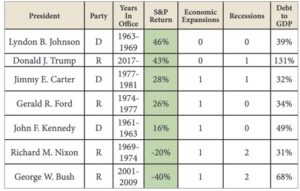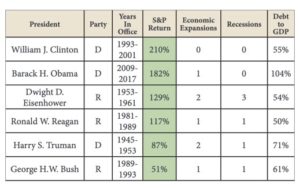Overview
The 2020 election presents an interesting distinction between candidates. While historically, the incumbent president has offered a certain stability for another four years, Donald Trump’s style of governing could be considered unorthodox and unpredictable at times. In contrast, former Vice President Joe Biden served for eight years under President Obama, and many feel his track record and style of governing may actually be the more predictable of the two.
Putting personal characteristics aside, each candidate’s stance on the policy issues can offer some clues as to how the country may respond under the next president — and the nation’s potential for economic growth in the future.
Policy Issues
According to recent surveys conducted by Pew Research, nearly 80% of registered voters report that the key to their vote will be the candidates’ policy direction for the economy.1 This is particularly important right now given this year’s rapid decline in growth and employment due to the COVID-19 pandemic.
On one hand, Trump sees continued reopening of the economy as the way to move the country forward and supports additional stimulus measures, such as a payroll tax cut. He advocates spending for roads, bridges and airports but has not been able to reach agreement with Congress on infrastructure spending.2
Biden is proposing infrastructure improvements once the pandemic is under control, but he also would help the environment. His proposal would create zero-emissions public transportation, build sustainable homes and create clean-energy jobs.3
According to Pew, 68% of voters also are very concerned with health care policy.4 This was a big issue in the 2016 election season, but since Congress remains divided, very little has been achieved to move the needle on the rising cost of medical care and health insurance. Trump continues to try to dismantle the Patient Protection and Affordable Care Act (PPACA) but has yet to introduce another comprehensive national health plan in its stead. Are voters resolved to live with continued headline drama that has been the hallmark of the current administration, or are they ready for a change? Moreover, how relevant is stock market performance to rank-and-file, middleAmerica voters?
Biden does not support a single-payer system such as the much-touted Medicare for All plan. He does favor making changes to strengthen and expand the current PPACA provisions, including adding a Medicare-like public option as another choice.5
Stock Market Performance
It is a common misconception that the stock market tends to outperform during the terms when there is a Republican president at the helm. This is because Republicans are historically more pro-business through deregulation policies and fiscally conservative spending.
By some measures, however, the stock market actually performs better when Democrats are in control. Based on the past four years, government spending has rocketed from $19 trillion in debt in 2016 to more than $26 trillion by mid-2020. During this time, the market has delivered surprisingly resilient returns, which offer a possible indicator that the stock market rather appreciates increased spending.6
This is further supported by the fact that from 1952 through June of 2020, Democratic presidents have yielded higher annualized real stock market returns than Republicans: specifically, 10.6% versus 4.8%. 7 The accompanying table provides the total percentage increase or decrease of the S&P as well as additional economic data under each president since 1945.
Stock Market Performance Under Each President Since 19458


Provided for illustrative purposes only. Past performance is not indicative of future results
“Bull markets and bear markets come and go, and it’s more to do with business cycles than presidents.”9
COVID Conundrum
Regardless of which candidate is elected and whether one political party assumes the trifecta of power in Washington, the biggest challenge to America’s economic future may well be the coronavirus. Up until the 2020 outbreak, the stock market had proved remarkably strong throughout the Trump administration, despite some short-term volatility. Even with the plunge after the early spring lockdown in many areas of the country, the stock market still managed to rebound in late March.
However, many analysts believe the market’s present sustainability is largely propped up by heavy stimulus from the government, via Congress and the Federal Reserve. Heading into the regular flu season, Americans wait to see if the two health conditions merge to plunge the country further into a health crisis, with some top economists observing that a full economic recovery may not be plausible until the coronavirus is under control.10
While economic concerns are generally the top driver in past elections, a recent Fortune-SurveyMonkey poll revealed that the primary political fear is the ongoing COVID-19 pandemic and public health. The data found that more than one-third (37%) of voters say that the pandemic is the No. 1 issue that will drive their vote.11
Final Thoughts
The historical data is clear: The stock market and economy tend to thrive more often under a Democratic president. However, the divisive political policies today tend to focus more on social issues than on economic ones — things like gun rights, equal rights, law enforcement and criminal justice reform, income disparities and immigration. As such, this year’s election could be more of a memorandum on pandemic and social fears than on economic policies or stock market performance.
The garden-variety advice for portfolio management in the wake of an election year remains the same, now more than ever: Don’t base your investment decisions on who the president is or which party controls Congress. Focus on yourself: your goals, your investment time horizon, your tolerance for day-to-day market volatility. Work with your advisor to develop a diverse asset allocation strategy designed to allow for flexibility and the resilience to weather political events, economic declines and pandemics.
Keep your eye on the long term, and contact your advisor any time you could use some reassurance. In short, keep your eye on your own future, and ignore the noise that accompanies this election season.
1 Pew Research Center. Aug. 13, 2020. “Important issues in the 2020 election.” https:// www.pewresearch.org/politics/2020/08/13/important-issues-in-the-2020-election/. Accessed Aug. 29, 2020.
2 Jeff Mason and David Shepardson. Reuters. “Trump team prepares $1 trillion infrastructure plan to spur economy.” https://www.reuters.com/article/us-usa-trump/trump-team-prepares-1-trillioninfrastructure-plan-to-spur-economy-idUSKBN23N0D7. Accessed Sept. 15, 2020.
3 Reuters. Aug. 10, 2020. “Where Biden and Trump stand on key issues.” https://graphics.reuters.com/USA-ELECTION/POLICY/ygdpzwarjvw/. Accessed Aug. 31, 2020.
4 Pew Research Center. Aug. 13, 2020. “Important issues in the 2020 election.” https:// www.pewresearch.org/politics/2020/08/13/important-issues-in-the-2020-election/. Accessed Aug. 29, 2020.
5 Reuters. Aug. 10, 2020. “Where Biden and Trump stand on key issues.” https:// graphics.reuters.com/USA-ELECTION/POLICY/ygdpzwarjvw/. Accessed Aug. 31, 2020.
6 Kimberly Amadeo and Michael J. Boyle. The Balance. July 30, 2020. “US National Debt by Year Compared to GDP and Major Events.” https://www.thebalance.com/nationaldebt-by-year-compared-to-gdp-and-major-events-3306287. Accessed Aug. 31, 2020.
7 Sergei Klebnikov and Halah Touryalai. Forbes. July 23, 2020. “We Looked At How The Stock Market Performed Under Every U.S. President Since Truman — And The Results Will Surprise You.” https://www.forbes.com/sites/sergeiklebnikov/2020/07/23/historical-stock-marketreturns-under-every-us-president/#28b7bf13faaf. Accessed Aug. 29, 2020.
8 Ibid. 9 Ibid. 10 Jeff Cox. CNBC. Aug. 8, 2020. “Fed’s Kashkari advocates six-week economic lockdown to defeat the coronavirus.” https://www.cnbc.com/2020/08/08/feds-kashkariadvocates-six-week-economic-lockdown-to-defeat-the-coronavirus.html. Accessed Aug. 29, 2020.
11 Nicole Goodkind. Fortune. July 30, 2020. “The economy is no longer Americans top concern heading into the 2020 election.” https://fortune.com/2020/07/30/coronavirusus-economy-election-issue-gdp-trump-biden-covid-19/. Accessed Aug. 29, 2020.
Investment advisory services offered only by duly registered individuals through AE Wealth Management, LLC. The advisory firm providing you this report is an independent financial services firm and is not an affiliate company of AE Wealth Management, LLC.
Investing involves risk, including the potential loss of principal. No investment strategy can guarantee a profit or protect against loss in periods of declining values.
The information and opinions contained herein provided by third parties have been obtained from sources believed to be reliable, but accuracy and completeness cannot be guaranteed by AE Wealth Management. This information is not intended to be used as the sole basis for financial decisions, nor should it be construed as advice designed to meet the particular needs of an individual’s situation. None of the information contained herein shall constitute an offer to sell or solicit any offer to buy a security or insurance product.